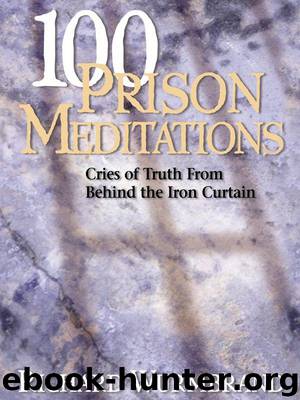100 Prison Meditations: Cries of Truth from Behind the Iron Curtain by Wurmbrand Richard

Author:Wurmbrand, Richard [Wurmbrand, Richard]
Language: eng
Format: mobi, epub
Tags: Philosophy
ISBN: 9780882640716
Publisher: Living Sacrifice Book Company
Published: 1999-12-31T16:00:00+00:00
48
Identification With Christ
David sang, “You will not leave my soul in Sheol, nor will You allow Your Holy One to see corruption. You will show me the path of life” (Psalm 16:10,11). Peter explains in Acts 2:27–31 that the prophet was speaking these words about Christ—that is, about someone other than himself, someone who would appear on earth many centuries in the future. Why then did David use the first person, not the third, speaking about the Messiah as if He were David himself?
This is because believers and the Messiah are not two persons, but one. We are His body, we are “of His flesh and of His bones” (Ephesians 5:30). The unity between ourselves and Christ could not have been expressed more realistically.
It can be understood figuratively that we are His flesh, but how can one explain symbolically that we are also “His bones”? It is a common expression that the Church is the mystical body of Christ, but it is not biblical. The words “symbolic” and “mystic” never occur in Scripture.
We are called His body, period. My body is myself. My legs do not walk: I walk. My lungs do not breathe: I breathe. It is not Christ’s members who suffer or rejoice: it is always Christ Himself. The identification is complete.
David speaks about the Savior using the first person, exactly as the Savior uses the first person when He speaks about me, the sinner for whom He dies. Psalm 69 is also Messianic. It is Christ Himself who speaks through the pen of David: “For my thirst they gave me vinegar to drink” (verse 21), and “zeal for Your house has eaten me up” (verse 9).
In the same psalm, we also read the words, “O God, You know my foolishness; and my sins are not hidden from You” (verse 5). Christ does not say that He will suffer ignominy for someone else’s foolishness and wrongs, but for His own. He has identified with the sinner. Luther writes in his commentary on Galatians, “the Christian is Christ.” By the same token, we could say, “Christ is the Christian.”
Identified with Him, we must share His fate. “In the day of trouble He shall hide me in His tent” (Psalm 27:5, according to the Hebrew). The rule established by the Jewish teachers called Masoretes for writing the “s” in the Hebrew word sukkah, “tent,” is that it be exceptionally small, half the size of the other letters. This is to show that one who wishes to be protected by Him must accept confinement and constraint in a small place just as He Himself found solace with only a little flock. (I was in a small cell with space only for two steps to and fro.)
But the letter “m” in iom, “day,” in “day of trouble,” is also written unusually small. For believers, days of trouble are small in comparison with the eternity of glory. We are identified with Him on His cross, but also in His victory.
Download
100 Prison Meditations: Cries of Truth from Behind the Iron Curtain by Wurmbrand Richard.epub
This site does not store any files on its server. We only index and link to content provided by other sites. Please contact the content providers to delete copyright contents if any and email us, we'll remove relevant links or contents immediately.
From Bacteria to Bach and Back by Daniel C. Dennett(2484)
The God delusion by Richard Dawkins(2309)
Boy Erased by Garrard Conley(1730)
THE SELFISH GENE by Richard Dawkins(1623)
The Falls by Unknown(1525)
God Is Not Great by Christopher Hitchens(1334)
Christopher Hitchens by The Portable Atheist: Essential Readings for the Nonbeliever(1320)
the god delusion by richard dawkins(1318)
Outgrowing God by Dawkins Richard(1316)
THE GOD DELUSION by Richard Dawkins(1309)
Drunk with Blood: God's Killings in the Bible by Steve Wells(1285)
Triumvirate of Rationalism: Thomas Paine, Thomas Jefferson, and George Orwell by Christopher Hitchens(1282)
The Rage Against God by Peter Hitchens(1266)
About the Holy Bible by Robert G. Ingersoll(1261)
The Atheist Muslim by Ali A. Rizvi(1230)
Atheism: A Very Short Introduction by Julian Baggini(1218)
Why I Am Not a Christian and Other Essays by Bertrand Russell(1182)
Emancipation of a Black Atheist by D. K. Evans(1151)
Battling the Gods by Tim Whitmarsh(1151)
